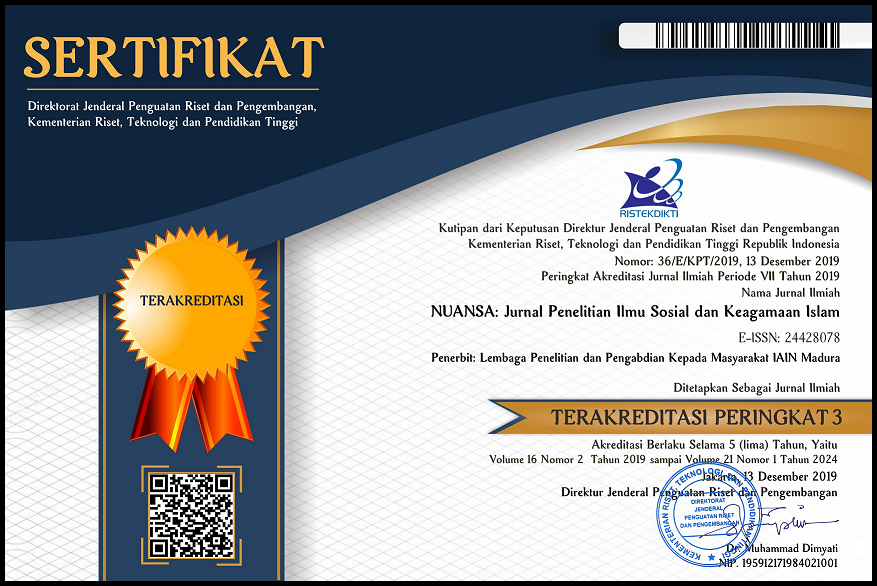GADAI SYARIAH LAHAN PRODUKTIF (Studi Kasus Di Desa Prancak Kecamatan Pasongsongan Kabupaten Sumenep)
 Abstract views: 213
,
Abstract views: 213
,
 PDF downloads: 152
PDF downloads: 152
Abstract
Downloads
References
Antonio, Muhammad Syafi’i, Bank Syariah: Dari Teori ke Praktik, Jakarta: Gema Insani Press, 2001.
Basyir, Ahmad Azhar, Asas-asas Hukum Muamalah (Hukum Perdata Islam), ed. Revisi, Yogyakarta: UII Press, 2000,
Al-Bukhari, Shahih Bukhari, Jilid III, Beirut: Dar al-Fikr, 1891.
Hadi, Sutrisna, Metodologi Research, Yogyakarta: Andi Offset, 1990.
Haroen, Nasrun, Figh Muamalah, Jakarta: Gaya Media Pratama, 2000.
Al-Jazairi, Abu Bakar Jabir, Ensiklopedi Muslim, Jakarta: darul Falah, 2004.
Al-Kasani, al-Bada’i’u ash-Shana’i’u, Jilid VI, Mesir: al-Muniriyah, t.t.
Al-Khatib, Asy-Syarbaini, Mughni al-Muhtaj, Jilid II, Beirut: Dar al-Fikr, 1978.
Moleong, Lexy J., Metodologi Penelitian Kualitatif, Bandung: PT. Remaja Rosdakarya, 2011.
Qudamah, Ibnu, al-Mughni, Jilid IV, Riyadh: Maktabah ar-Riyadh al-Haditsah, t.t.
Rifa’i, Moh., Tafsir al-Qur’an al-Karim; Terjemah/Tafsir al-Qur’an, Semarang: CV. Widya Karsa Pratama, 1993.
Rusyd, Ibnu, Bidayah al-Mujtahid wa Nihayatuhu al-Muqtashid, Jilid II, Beirut: Dar al-Fikr, 1978.
Sabiq, Sayyid, Fiqh as-Sunnah, Jilid III, Beirut: Dar al-fikr, t.t.
Said, Abdullah as-Sattar Fathullah, al-Mu’amalat fi al-Islam, Mekah: Rabithah al-Alam al-Islami: Idarah al-Kitab al-Islami, 1402 H.
Sarwono, Jonathan, Metode Penelitian Kuantitatif dan Kualitatif, Yogyakarta: Graha Ilmu, 2006.
Singarimbun, Masri, dan Sofyan, Metode Penelitian Survai, Jakarta: LP3ES, 1989.
Az-Zuhaili, Wahbah, al-Fiqh al-Islam wa Adillatuh, Jilid V, Beirut: Dar al-Fikr 1984.
The journal operates an Open Access policy under a Creative Commons Attribution-NonCommercial 4.0 International License (CC-BY-NC) 
Authors who publish with this journal agree to the following terms:
- Authors retain copyright and grant the journal right of first publication with the work simultaneously licensed under a Creative Commons Attribution License that allows others to share the work with an acknowledgement of the work's authorship and initial publication in this journal.
- Authors are able to enter into separate, additional contractual arrangements for the non-exclusive distribution of the journal's published version of the work (e.g., post it to an institutional repository or publish it in a book), with an acknowledgement of its initial publication in this journal.
- Authors are permitted and encouraged to post their work online (e.g., in institutional repositories or on their website) prior to and during the submission process, as it can lead to productive exchanges, as well as earlier and greater citation of published work.






















